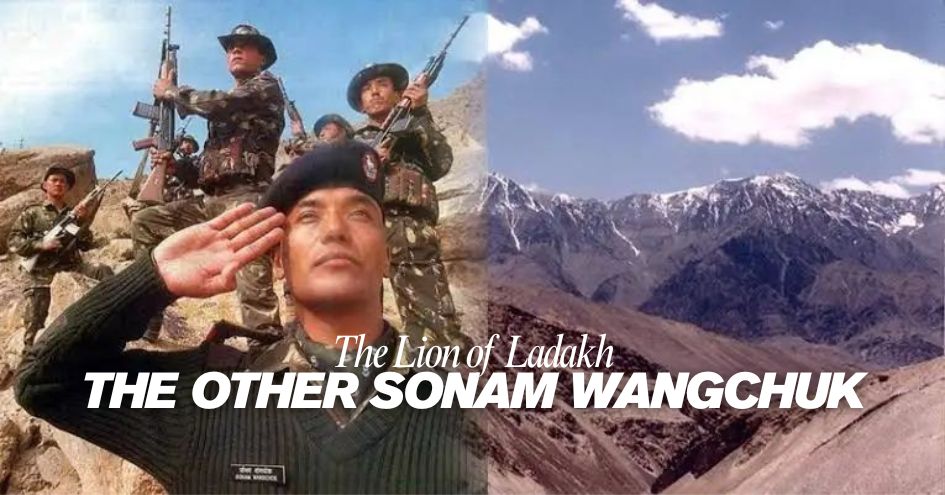
The Gathering Storm
The year was 1999. In the remote Batalik sector of Ladakh, the silence of the mountains hid a sinister truth. Pakistani intruders had slipped across the Line of Control, occupying towering ridgelines. These positions overlooked vital Indian supply routes, threatening to choke the lifeline of Ladakh.
In those days of uncertainty, one man – Major Sonam Wangchuk of the Ladakh Scouts – stood ready. A son of the mountains, hardened by the rarefied air and icy winds, Wangchuk knew these treacherous slopes like the lines of his own palm. When his unit received orders to push the enemy back, he understood the magnitude of the task: a handful of men against an enemy dug into near-impenetrable heights.
On the night of 31 May 1999, Major Wangchuk assembled just twenty-five men. Their mission: to probe, locate, and, if possible, evict the intruders. Laden with rifles, grenades, and their unbreakable will, they began the climb.
Every step was a battle – the thin air choked their lungs, icy winds cut their skin, and the sharp rocks threatened to betray their movement. Yet Wangchuk’s calm voice kept them steady. He walked among them, not as a distant commander, but as a brother leading his brothers into battle.
The mountain was both their shield and their enemy. Darkness hid them, but one slip meant certain death. Above, unseen eyes watched, rifles ready.
The Ambush
As dawn crept over the peaks, disaster struck. Bursts of automatic fire shattered the silence. The intruders had spotted them. Bullets ricocheted off the rocks, forcing Wangchuk’s men to dive for cover. For a moment, chaos loomed. But in that critical instant, Wangchuk’s voice cut through the storm: “Don’t panic. Follow me.” His calmness was infectious. The men steadied, returning fire with precision. Still, the enemy had the advantage of height, raining death from above.
Wangchuk quickly sized up the situation. A frontal attack would be suicide. The only way was to outflank the enemy – a manoeuvre as dangerous as it was bold. Crawling across near-vertical ice slopes, Wangchuk led a small detachment. They moved like shadows, hugging the rock face, every muscle straining, every nerve alert. The mountain could betray them at any second – one loose rock, one sound, and the enemy would cut them down. Hours seemed like minutes. Then, as they crept behind the enemy’s ridge, Wangchuk signalled. The time had come.
With a roar that echoed across the valley, the Ladakh Scouts charged. Grenades exploded, rifles cracked, and the surprise was complete. The enemy fighters, stunned by the audacity of the assault, panicked. Some fell to Indian bullets, others scrambled to flee. Their stronghold had been shattered by sheer courage.
Victory at Batalik
By the end of the engagement, the ridge was back in Indian hands. Documents, weapons, and supplies left behind by the intruders proved vital for the operations that followed.
What Wangchuk and his men achieved that day was not just the recapture of ground – it was the first decisive blow of the Kargil War. The enemy had been beaten back, and Indian soldiers across the front drew strength from the tale of twenty-five men who had stared death in the eye and won.
The First Hero of Kargil
News of the victory spread quickly. In Delhi, in army messes, and in villages across Ladakh, one name was whispered with awe: Major Sonam Wangchuk. For his gallantry, leadership, and indomitable spirit, he was awarded the Maha Vir Chakra, becoming the first hero of the Kargil War to be decorated. But for Wangchuk himself, the medal was secondary. His pride lay in his men, in their courage, and in the fact that the tricolour once again flew over the captured ridge.
The Lion of Ladakh
Years later, the mountains of Ladakh still echo with his legend. To his people, he is more than a soldier – he is a guardian of the land, a symbol of Ladakhi resilience. To the Indian Army, he is a reminder of what leadership, courage, and faith can achieve against impossible odds.
Colonel Sonam Wangchuk, MVC, will forever be remembered as the Lion of Ladakh, the man who turned the tide in the opening days of Kargil.
 Wing Commander BS Sudarshan is a former Indian Air Force pilot with over 12,000 flying hours. He participated in Operation Pawan and Operation Cactus before he transitioned to civil aviation. A passionate writer, he has authored six books, including "Hasiru Hampe", appreciated by S L Bhyrappa, and the latest "Evergreen Hampi". He is a regular contributor to the Verandah Club.
Wing Commander BS Sudarshan is a former Indian Air Force pilot with over 12,000 flying hours. He participated in Operation Pawan and Operation Cactus before he transitioned to civil aviation. A passionate writer, he has authored six books, including "Hasiru Hampe", appreciated by S L Bhyrappa, and the latest "Evergreen Hampi". He is a regular contributor to the Verandah Club.
PREVIOUS ARTICLE
NEXT ARTICLE

The Venkateshwara Swami Temple in Tirupati is among the holiest places in the world for Hindus. Millions of people throng the temple every year to get...

It is a sad reality that our Itihasa and Puranas have been subject to severe distortion over the years. This is not surprising considering how even th...

The holy land of Bharat follows Sanatana Dharma. The word Sanatana Dharma is a Sanskrit word meaning, “Eternal law”. It is the indestructible ultimate...